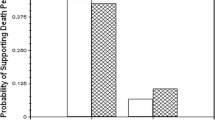Abstract
This study provides a straightforward test of the proposition that people who are permitted to serve on juries in capital cases (death-qualified jurors) are more likely to convict a defendant than are people who are excluded from serving on capital juries due to their unwillingness to impose the death penalty (excludable jurors). A sample of 288 subjects classified as death-qualified or excludable under theWitherspoon standard watched a 2 1/2-hour videotape of a simulated homicide trial including the judge's instructions, and gave an initial verdict. Death-qualified subjects were significantly more likely than excludable subjects to vote guilty, both on the initial ballot and after an hour's deliberation in 12-person juries. Nine juries were composed entirely of death-qualified subjects (death-qualified juries), while 10 contained from 2 to 4 excludable subjects (mixed juries). On postdeliberation measures, with initial death-penalty attitudes controlled, subjects who had served on the mixed juries were generally more critical of the witnesses, less satisfied with their juries, and better able to remember the evidence than subjects from the death-qualified juries, suggesting that diversity may improve the vigor, thoroughness, and accuracy of the jury's deliberations.
Similar content being viewed by others
References
Bazelon, D. L. Veils, values, and social responsibility. Address to the 89th annual convention of the American Psychological Association, Los Angeles, California, 1981.
Boehm, V. R. Mr. Prejudice, Miss Sympathy, and the authoritarian personality: An application of psychological measuring techniques to the problem of jury bias.Wisconsin Law Review, 1968, 734.
Carlsmith, J. M., Ellsworth, P. C., & Aronson, E.Methods of Research in Social Psychology. Reading, Massachusetts: Addison-Wesley, 1976.
Fitzgerald, R., and Ellsworth, P. C. Due process vs. crime control: Death qualification and jury attitudes.Law and Human Behavior, 1984,8, 31–52.
Goldberg, F. Toward expansion of Witherspoon: Capital scruples, jury bias, and the use of psychological presumptions in the law.Harvard Civil Rights Law Journal, 1970,5, 53.
Louis Harris & Associates, Inc. Study No. 2016 (Unpublished), 1971.
Hastie, R., Penrod, S. D., & Pennington, N.Inside the jury. Cambridge, Massachusetts: Harvard University Press (in press).
Jurow, G. New data on the effect of a death-qualified jury on the guilt determination process.Harvard Law Review, 1971,84, 567–611.
Oberer, W. E. Does disqualification of jurors for scruples against capital punishment constitute denial of fair trial on the issue of guilt?University of Texas Law Review, 1961,39, 545.
Osser, A. I., & Berstein, B. The death-oriented jury shall live.University of San Fernando Valley Law Review, 1968,1, 253–258.
Thompson, W. C., Cowan, C. L., Ellsworth, P. C., & Harrington, J. C. Death penalty attitudes and conviction proneness: The translation of attitudes into verdicts.Law and Human Behavior, 1984,8, 95–114.
Tyler, T., & Weber, R. Support for the death penalty: Instrumental response to crime or symbolic attitude?Law and Society Review, 1982,17, 21–46.
Vidmar, N., & Ellsworth, P. C. Public opinion and the death penalty.Stanford Law Review, 1974,26, 1245–1270.
White, W. S. The constitutional invalidity of convictions imposed by death-qualified juries.Cornell Law Review, 1973,58, 1176.
Wilson, W. C. Belief in capital punishment and jury performance. Unpublished manuscript. University of Texas, 1964.
Zeisel, H. Some data on juror attitudes toward capital punishment. Monograph. Center for Studies in Criminal Justice, University of Chicago Law School, 1968.
Author information
Authors and Affiliations
Additional information
This research was supported in part by the Veatch Program of the North Shore Unitarian Society and in part by the Abelard Foundation. We are grateful to John Kazubowski, executive officer of the Santa Clara County Superior Court, Gabriel Gorenstein, Hans Zeisel, and Philip G. Zimbardo for their help in various phases of the research. We are especially grateful to Reid Hastie for allowing us to use his videotape and for helping us in numerous other ways.
About this article
Cite this article
Cowan, C.L., Thompson, W.C. & Ellsworth, P.C. The effects of death qualification on jurors' predisposition to convict and on the quality of deliberation. Law Hum Behav 8, 53–79 (1984). https://doi.org/10.1007/BF01044351
Issue Date:
DOI: https://doi.org/10.1007/BF01044351




